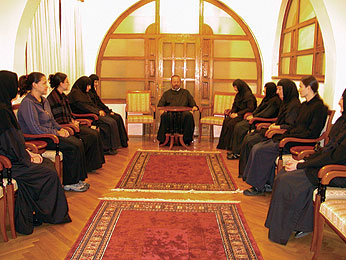Whether We Live or Die, We Are Our Lord’s ( 24.10.2007 )
 Today, in the evening, Metropolitan Nahum of Strumica held a synaxis at Vodoča monastery of the Protection of the Most Holy Theotokos.
Today, in the evening, Metropolitan Nahum of Strumica held a synaxis at Vodoča monastery of the Protection of the Most Holy Theotokos.
“
Fear is the prime mover of the slave’s relationship. A man is afraid not to be punished with illness, with some misfortune or with death, and this because he has not performed certain religious duties. What is worst, he is afraid he will be punished by God Himself.
Interest is the prime mover of the hired servant’s i.e. trade relationship. A man reckons that by performance of certain religious duties, in return, he will get from God health, success in life and material goods, and eventually, following the satiation with life, salvation in Paradise, too.
Love is the sole reason for the struggle for building a son’s relationship with God. God’s children seek Him, their Heavenly Father, and nothing else. The receiving of some of God’s gifts, regardless of whether these be heavenly or earthly, they live to His holy providence for their salvation; and that’s it. The attitude of God’s children to their Heavenly Father is one of thanksgiving, of giving and self-offering, without expecting anything in return at that. They, seeking only Him, already in this life live the mystery of that: all Mine is yours…
As I have told you before, we do not become part of the Church because of health, because of success in our work or because of power and money, not even because of salvation – but because of Him. For, whenever we go to Church because of something (be it even salvation), rather than because of Him, and whenever we seek in the Church something else (be it even salvation), and not Him – we are in fact building with God a hired servant’s relationship, instead of a free, loving, and son’s (personal) one.
He who lives as a child of God, even in the illness, even in any misfortune, and even in death itself sees and recognizes only God’s love to him. The more terrible is what he is undergoing, the greater love does he recognize. Death to him is not a heavy bond of fear that bounds to the earthly, but a desired transition of freedom towards God. Neither body nor soul is spared in this move of love. This is the way in which God’s child functions, although this must certainly seem strange and even insane to slaves and hired servants.
If we take a look at the events from this perspective, I think that immediately we will get the clear answer to the question: Why does someone so pious and good die so young and so tragically? The too early death of the good one, at least to me, is only a witness to his deep, personal, and son’s relationship with God; a witness to his yearning; a witness to that: not what, but Whom did he seek…
According to the Holy Fathers, the sinner’s long life is a granted time for the foreseen repentance or space left for the foreseen good offspring from his lineage.
It is another question: Why exactly now and why exactly in that way does someone die? The time and manner of our death are a matter of God’s estimation or providence: when it is the best for it to happen for our salvation, perfection, and sanctification; and also, when it is the best for it to happen for the salvation, perfection, and sanctification of our fellowmen.
As a matter of fact, we cannot possibly know everything, nor is it of any use to us, but we can and we desire to submit in everything to God’s will, and that is enough for us. We are not God’s judges, we are God’s children…
The monk is a child of God. The monk is called to proclaim that this world and its form are passing away; that there will be resurrection of the dead, in body; that a new earth and new heaven will come to pass; that in the end love will remain; that in the end the person, in communion, will remain; that there will be new relationships established by the image and likeness of the Holy Trinity; that we will live in a place of brightness… where there will be no suffering, sorrow, and sighing, but live eternal… The monk proclaims that all this has not yet happened, but also that it is already happening…
The monk is a witness of the death to this world, yet also a witness of the life for God, in Christ Jesus, our Lord. The monk dies to the world when he physically detaches himself from it. The monk dies to the world also when inside him he gets free from the bondage to his passions. However, the monk completely dies to the world when he prayerfully buries his mind and when he constantly tries to keep his mind in prayer inside his heart, waiting there for the gift of Christ’s resurrection, waiting there for the light of the Day without evening in the kingdom of the Father and of the Son and of the Holy Spirit.”
(as recorded by the monastery sisterhood)